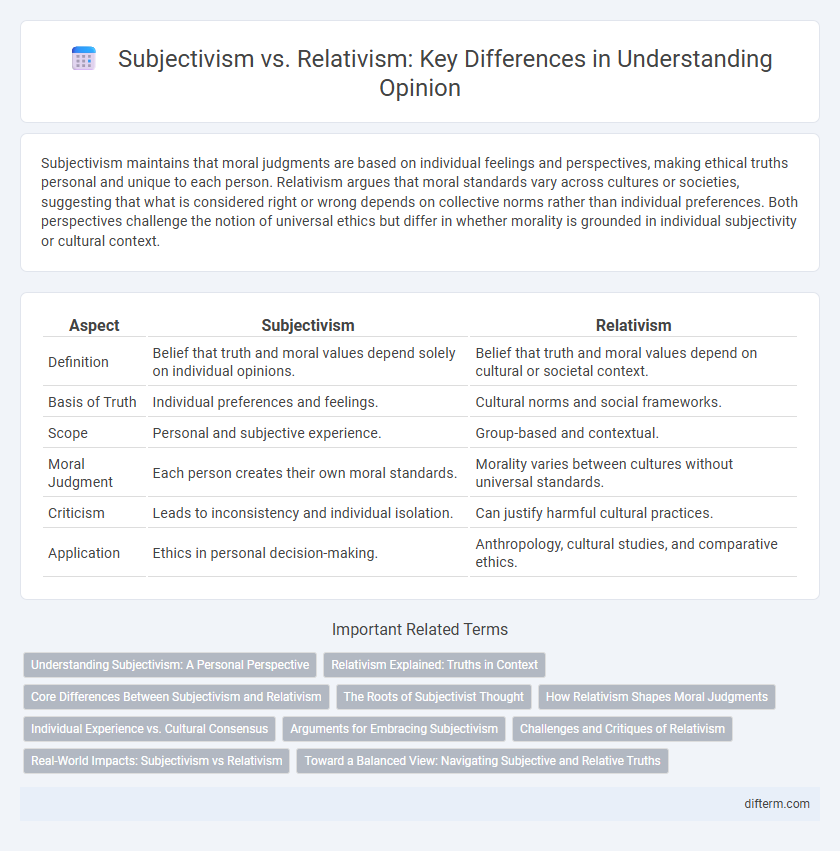Subjectivism maintains that moral judgments are based on individual feelings and perspectives, making ethical truths personal and unique to each person. Relativism argues that moral standards vary across cultures or societies, suggesting that what is considered right or wrong depends on collective norms rather than individual preferences. Both perspectives challenge the notion of universal ethics but differ in whether morality is grounded in individual subjectivity or cultural context.
Table of Comparison
| Aspect | Subjectivism | Relativism |
|---|---|---|
| Definition | Belief that truth and moral values depend solely on individual opinions. | Belief that truth and moral values depend on cultural or societal context. |
| Basis of Truth | Individual preferences and feelings. | Cultural norms and social frameworks. |
| Scope | Personal and subjective experience. | Group-based and contextual. |
| Moral Judgment | Each person creates their own moral standards. | Morality varies between cultures without universal standards. |
| Criticism | Leads to inconsistency and individual isolation. | Can justify harmful cultural practices. |
| Application | Ethics in personal decision-making. | Anthropology, cultural studies, and comparative ethics. |
Understanding Subjectivism: A Personal Perspective
Subjectivism emphasizes the role of individual experience and personal beliefs in shaping truths, asserting that reality is filtered through personal perspectives. This philosophical stance argues that moral judgments and knowledge claims depend on individual feelings, making truth inherently personal and variable. Understanding subjectivism requires recognizing how personal biases and subjective consciousness influence one's interpretation of the world.
Relativism Explained: Truths in Context
Relativism asserts that truths are not absolute but depend on cultural, historical, or personal contexts, making knowledge inherently variable across societies. Unlike subjectivism, which centers on individual perspectives, relativism emphasizes collective frameworks influencing what is considered true or valid. This approach challenges universal claims by highlighting the diversity of human experience and the situational nature of reality.
Core Differences Between Subjectivism and Relativism
Subjectivism asserts that truth is determined by individual beliefs or feelings, making moral judgments inherently personal and internally consistent. Relativism, in contrast, holds that truth and morality depend on cultural, societal, or contextual frameworks, implying variability across groups rather than individuals. The core difference lies in subjectivism's emphasis on personal perspective versus relativism's focus on collective or contextual standards.
The Roots of Subjectivist Thought
Subjectivism traces its roots to Cartesian philosophy, emphasizing individual consciousness as the foundation of knowledge and truth. Unlike relativism, which situates truth within cultural or social frameworks, subjectivism centers on personal experience and introspection as the ultimate arbiters of meaning. This shift highlights the primacy of the self in constructing reality, challenging objective standards and external verification.
How Relativism Shapes Moral Judgments
Relativism shapes moral judgments by emphasizing the context and cultural background that influence ethical perspectives, rejecting absolute standards in favor of diverse moral frameworks. It recognizes that moral truths vary across societies, making judgments contingent on social norms rather than universal principles. This approach challenges objectivist claims, promoting tolerance and understanding of differing moral codes while complicating consensus on right and wrong.
Individual Experience vs. Cultural Consensus
Subjectivism emphasizes personal experience as the foundation of truth, asserting that individual perspectives shape reality uniquely. Relativism prioritizes cultural consensus, suggesting that truth varies based on societal norms and collective beliefs within different communities. Understanding the tension between subjective experiences and cultural agreements reveals how personal identity and social context influence moral and epistemic judgments.
Arguments for Embracing Subjectivism
Subjectivism asserts that truth depends on individual perspectives, allowing personal experiences to shape moral judgments and fostering tolerance for diverse viewpoints. Unlike relativism, which ties truth to cultural or societal frameworks, subjectivism empowers individuals to claim authentic understanding based on internal reflection. Embracing subjectivism encourages moral autonomy and respects personal conscience as the foundation for ethical decisions.
Challenges and Critiques of Relativism
Relativism faces significant challenges due to its inherent risk of logical inconsistency, as it asserts that truth varies based on individual or cultural perspectives, making universal moral standards difficult to uphold. Critics argue that relativism can lead to ethical paralysis or justify harmful practices by dismissing objective evaluation and accountability. The tension between respecting diverse viewpoints and maintaining coherent normative frameworks remains a central critique in philosophical discourse.
Real-World Impacts: Subjectivism vs Relativism
Subjectivism, which holds that moral truths depend solely on individual beliefs, can lead to inconsistent ethical decisions and challenges in forming cohesive policies. Relativism, by grounding morality in cultural or societal norms, fosters tolerance but may permit practices that conflict with universal human rights. Understanding these distinctions highlights the practical tension between personal freedom and social cohesion in real-world ethics.
Toward a Balanced View: Navigating Subjective and Relative Truths
Subjectivism emphasizes individual perception as the source of truth, while relativism asserts that truth varies across cultures or contexts. Navigating these perspectives requires recognizing the validity of personal experiences without dismissing broader societal frameworks. A balanced view fosters critical engagement by integrating subjective insights with an awareness of cultural and contextual influences.
subjectivism vs relativism Infographic

 difterm.com
difterm.com